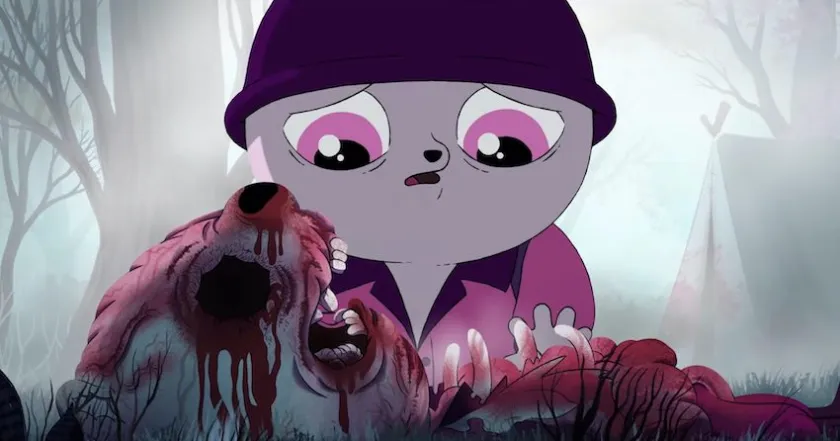Alberto Vazquez directs a grim story of war that spares nothing despite its cartoon depiction.
Director Alberto Vazquez has said his latest work of animated annihilation, Unicorn Wars, is inspired by three tentpole texts: Apocalypse Now, Bambi, and the Bible. We rarely see a film that’s such a clear summation of its sources. Vazquez has taken these familiar stories and ran them through an organ grinder made of rainbow-colored steel.
At once a visceral, gory, rampaging journey into the “Heart of Darkness” and a lovingly complex story of brotherhood, Unicorn Wars blew off my jaw. This tale of two teddy bear brothers, Tubby (Jaione Insausti) and Bluey (Jon Goiri), and their military mission to kill every last unicorn is brutal. But it’s not wasted brutality. Complex lessons about life, family, and nation are taught and learned in a concise amount of time. Sure, much time is spent enjoying the squishy slaughter, but it’s not without cost.
For a story about the blood feud between bears and unicorns, it’s remarkably human. Tubby and Bluey don’t have an ideal or whole childhood. They each feel abandoned by a parent and Vazquez doesn’t shy away from how abandonment has shaped them into characters. Ultimately, the shame of those feelings will lead them on separate paths, one toward peace, the other toward dominance. What could have easily been a self-congratulatory fabrication overstuffed with shock and gore is actually a tender and endearing tale of brother vs brother.

Vazquez’s previous film, Birdboy: The Forgotten Children (2015), has the viewer experience a world so expansive that it rightly wanders and explores off the beaten path of the plot. Unicorn Wars feels more “on a mission,” as it were. Like any good war epic, there’s a noticeable beginning, middle, and end of the narrative map. But just as in Apocalypse Now, where the film gets swamped in jumbled bits of politico-religious ideology that doesn’t transubstantiate as tenderly or easily as he thinks it does. Still, Vazquez continues his streak of visually dazzling films that work hard to be more than something nice to look at. Where Birdboy was tinged with a surreal and quirky darkness, Unicorn Wars tries to push the limits of how menacing bright pastel animation can get.
The cognitive dissonance of watching these sweet-looking creatures enact such horrible but vibrantly drawn violence is difficult to get over. Though you may be tempted to believe this is nothing more than gore for gore’s sake, there is no such thing as senseless violence in Unicorn Wars. Once we take this silly form seriously, the weaponized cuteness is rather compelling. As in Bambi, it helps us feel the brutality differently than we usually do in a war story. It hurts deeper and more often. Following Tubby’s noble example, the film challenges us to step back from the supposed innocence of what we’re seeing, register the hate and dogma we’re hearing, then think critically. In doing so Alberto Vazquez places Unicorn Wars in the same pantheon of great anti-war films like the ones that inspired him.
Unicorn Wars is in limited theatrical release & VOD.